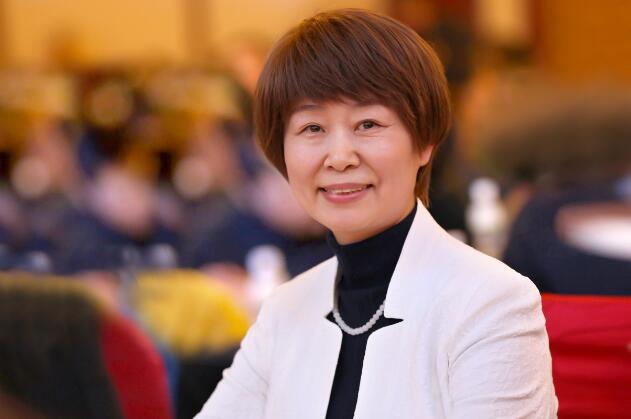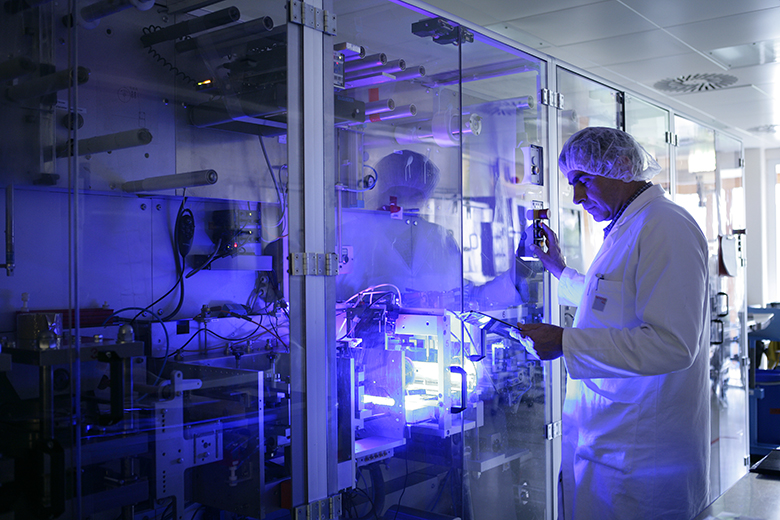
Scan the QR
to read the magazine on mobile phone
On the morning of November 7, the 2019 International Conference on Pharmaceutical Innovation and Development was officially kicked off in Yantai. Shortly before the conference, a piece of good news from the United States was announced, which inspired Chinese pharmaceutical companies and added luster to the conference.
The Risperidone Extended-Release Microsphere for Injection (LY03004), an innovative drug independently developed by Luye Pharma, is one step closer to being approved for the U.S. market. The company has received a formal inspection report from the US Food and Drug Administration (FDA), indicating that the manufacturing site for the production of long-acting agents have successfully passed the pre-approval inspection (PAI) with zero defects. This means that China's first self-developed microsphere product, which is also the first innovative drug from China that has submitted NDA in the United States, will soon usher in a new era for the Chinese pharmaceutical industry.
The historic breakthrough of Luye Pharma-having passed the FDA PAI with zero defects- has aroused great attention of the domestic pharmaceutical industry. Xue Yunli, senior vice president of Luye Pharma, said in an interview that it was the company’s global vision, solid R&D capability, and its long-standing quality system that strictly follows the highest international standards that has enabled it to create such a historic achievement.

▲ Xue Yunli, senior vice-president of Luye Pharma
To showcase Luye’s practical experience for the pharmaceutical industry, recently, our reporter conducted an exclusive interview with Xue Yunli to get a better understanding of Luye Pharma’s strategic planning, its growing internationalization, and the progress made in building up its supply chain.
Enterprise supply chain capability determines product competitiveness
The Chinese pharmaceutical industry is transforming from big scale to high quality. How to promote the successful commercialization of innovative research results is an issue that Chinese pharmaceutical companies need to address now. In the pharmaceutical industry, the topic of innovation and translating it into real-world results has also received a lot of attention. The importance of R&D innovation has been widely acknowledged by the entire industry. As the industry transforms towards being better at translating innovations to results, it is critical that global pharmaceutical companies prioritize building a complete supply chain system, not just building innovation capabilities.
In this regard, Xue Yunli said, “This is a topic that requires careful consideration.” The ability to transfer lab discoveries into practical products is an important part of the industry’s evolution. This requires close coordination between decision makers, R&D, manufacturing plants, quality & supply chain departments, an appropriate organization structure, effective process control, and a strong sense of responsibility and mission to drive innovation results towards commercialization.
The concept of supply chain originates from developed countries in the West. With the increase of innovation costs and risks, and the development of ICH (the international coordination organization for developing the standards for drug registration technology) in the past 20 years, innovators in the pharmaceutical industry have become more and more inclined to embracing globalization to increase innovation efficiency and reduce costs. For example, Xue Yunli said that the API of an innovative product could be produced in China, and its excipients could be produced in Germany, and that its early discovery could be in Israel, and its non-clinical research could be conducted in China, while its clinical studies could be carried out in Europe-USA-China, and the multi-site production and packaging and storage of the final product could be in the United States - Europe – China. Thanks to cold chain transportation and temperature control technologies, products can be shipped through the customs to meet the needs of patients all over the world, bringing to fruition a supply chain connecting the world’s resources with patients in need. Organizational structure design, operation processes, capacity planning, integration optimization, quality assurance, talents training and supplier management are particularly important elements of the supply chain process. "How well a company can streamline its supply chain is a huge part of determining the overall efficiency and cost of a company, which determines the price competitiveness of its products in the global market." Xue Yunli said.
The importance of the supply chain is self-evident. In terms of global supply chain capacity building, Luye Pharma has taken a global lead.
Xue Yunli said that globalization is a strategic choice for Luye Pharma. “The strategic goal of the supply chain is to help the company create value and enhance competitiveness. Through ten years of hard work we plan to have manufacturing sites for our special drug products and strategic partners in major global markets to achieve the goal of delivering the highest quality drugs to patients with the shortest distance and the fastest speed.”
To this end, since 2008 Luye Pharma has rolled out a global pharmaceutical production base with long-acting preparations and biopharmaceutical production capacity in Yantai High Technology Zone. In 2016, the company deployed a production base in Germany for patch products, and in 2019 launched its second global production base in Nanjing Pharmaceutical Valley. It’s brought in global international talent, and strengthened its ability to build excellent production and quality management systems. In 2013, the global production base in Yantai passed the GMP inspection by the EMA. In July 2019, the long-acting drug production base for LY03004, indicated for treating schizophrenia and bipolar disorder, passed the on-site inspection by the US FDA.
In March 2019, the supply chain management department of Luye Pharma was established to support Luye Pharma’s strategic initiative in promoting the antidepressant Seroquel in 51 countries and regions. Seroquel IR is produced in China and supplied to Europe, China and Asia Pacific countries, while Seroquel XR is produced in the United States and packaged in China. The testing and batch release of Seroquel is in the UK, and its APIs are produced in Belgium. The supply chain department is responsible for the selection of API and excipients for new drugs, global CDMO, cold chain transportation of long-acting agents, cost optimization, and overseas plants planning. In order to speed up product technology transfer and the launch of new drugs, Luye has signed a strategic partnership agreement on API with Spanish partners, an CMO agreement with a US pharmaceutical company on an FPS solvent, as well as an agreement with a Switzerland partner on the supply of narcotic and psychotropic drug category API. To import Jin Siming (Rivastigmine Patch), a Luye drug for the treatment of dementia, from Germany to China, Luye integrated a traceability code system named “Coding Assurance” with a German QR code traceability system in August 2019. The “Coding Assurance” software was successfully tested through the validation of hundreds of input and output codes. This is the successful application of a Chinese innovative software system “Coding Assurance” in Germany for the first time. This success not only reduces the capital investment to build a coded packaging production line, but also shortened the time needed to import the drugs.
Buiding Luye Pharma’s Model to a world-class level
Luye Pharma’s success in supply chain is easy to see. Today multiple new products including LY03004 are either in the NDA or late clinical stage, and to achieve their commercialization, Luye Pharma has successfully come up with the Luye Model in terms of process, excipients, and technology. Speaking of this model, Xue Yunli said, "This is the embodiment of the company's comprehensive strengths."
“From a technology’s initial pilot to full commercial production is a long road.” Xue Yunli introduced that to meet the requirements of developed countries, especially the US FDA cGMP, the robustness of the production process is the key. How to ensure process robustness? Xue Yunli believes that the industrialization of aseptic preparation requires a breakthrough in transfer engineering technology to reduce manual intervention; it is only possible to achieve this goal by applying the concept of “Quality by Design” into every aspect of the project, such as the link technology between equipment, the automatic control technology for feeding and discharging devices, and the technology for cleaning and pipeline passivation. The project team spent two years to overcome the technical difficulties of microsphere industrialization, forming a proprietary technical standards system incorporating both the process and the equipment. "It is not an easy task for a team or an organization to establish an ICH-compliant system. It requires dedication, long-term training, and a quality-first culture. The lack of any element brings significant risk," Xue Yunli said.

▲ Luye Pharma (China) Smart Production Line
Although the supply chain system has definitely made an impact, there is still a big gap between the practices of Chinese pharmaceutical companies and the practices of global Big Pharma. So Luye’s next step is to continue to improve the supply chain capacity; this is one of the top priorities for Luye Pharma.
Xue Yunli disclosed that Luye Pharma, AstraZeneca and other multinational pharmaceutical companies have had many in-depth exchanges and discussions on the construction of supply chain systems. These multinational pharmaceutical companies have accumulated over decades or even hundreds of years of experience, and they have established an optimized global supply chain, process construction and decision-making mechanisms to ensure that every process from R&D to commercial supply runs within a well-established supply chain system.
“Regarding the aforementioned, China's pharmaceutical companies still have a lot to learn and implement.” Xue Yunli believes that, first of all, it is necessary to understand the true meaning of supply chain construction and fully understand the key role of the supply chain in the entire drug life cycle. In the meantime, it is necessary to use supply chain software systems to improve the operational efficiency of the supply chain. Luye Pharma is in the process of developing its own supply chain software systems, with expected implementation and roll-out in 2020. Finally, Chinese pharmaceutical enterprises need to find and cultivate the supply chain talent suitable for the development conditions in each market.
Win international market through a complete supply chain
Although technological innovation and building a complete supply chain are important, the ultimate goal is to enable patients to use high quality medicine to achieve tangible therapeutic results. “To better meet the needs of patients is always the ultimate goal of pharmaceutical companies.” Building a global supply chain system, in Xue Yunli’s opinion, can not only enable pharmaceutical companies to provide the same level of high quality products to patients in different countries and regions around the world, but also reduce the costs of pharmaceutical companies in procurement, production, transportation etc. as the system gets more and more optimized. While helping reduce the operating costs of enterprises, patients can purchase high-quality drugs of uniform quality at a lower price.

▲ Luye Pharma (Germany) Smart Production Line
It’s thus clear that pursuing a globalization strategy not only can help enterprises enhance their competitiveness, but also brings benefits to patients. How will Luye’s globalization strategy be implemented, and what is the company’s future direction and goals? In this regard, Xue Yunli introduced that globalization is the strategic goal set at the beginning of the establishment of Luye Pharma. Over the years, Luye Pharma has not only applied globalization to its supply chain, but also actively benchmarked international advanced standards in the design of industrial projects. Supply chain planning has to meet the international positioning of the company, and its planning is strategic. “Currently, Luye Pharma has a production base in Germany and a supply chain system in Switzerland. Next, we will extend our supply chain to more countries and regions in Europe, combining our mature innovation process from China with the mature supply in Europe, further enhancing the quality of our supply capacity overseas," Xue Yunli said firmly.
(Article quoted from "Yantai Daily")

